Getting Better All the Time
Congratulations on making a success of a tough semester. Thank you for the care and compassion you showed your students—you kept them motivated to persist, and they acknowledged your dedication in hundreds of thank-yous. We can all be proud of the learning our students did this fall; and now that we’re done (or almost done, if you’re still grading) we get the pleasure of starting to ruminate a little on what we’ve learned, too. One of the exciting things about teaching is that it’s a puzzle of infinite complexity. Each semester we learn more about our craft, so each time we teach, we can make our courses a little more powerful and effective—and we can have a little more fun teaching.
It’s easy to lose the opportunity in the flurry of holiday preparation, or in exhaustion, but it’s worth carving out some time to reflect on the courses we taught this semester. Our exceptionally organized colleagues may take notes about what worked best and what flopped after each class day—one even uses color-coordinated post-its for things to keep, things to change, and new ideas—but the rest of us probably still need to write down our reflections or make some changes to our spring plans, before we forget. If it’s already getting difficult to remember what we wanted to tinker with after the break, we can look back at our course schedules, Canvas shells, assignments, exams, or students’ work.
As we reflect, we should focus first on what worked best. Which course goals were you delighted to see students attain? What exercises or practice really moved them along? Next, we can identify where students struggled or were frustrated, and where we ourselves struggled or were frustrated. We might consider, for example, the pacing of the course, whether students needed more or less time than we expected to master a concept or develop a skill. We can think about our priorities and whether the work students spent the most time on aligned with those priorities. We can identify where communication broke down, where our expectations and students’ interpretation of them didn’t match up. If students performed poorly on a particular assignment or exam, could we make the instructions and criteria more transparent? Did they need more scaffolding to exercise particular skills? Perhaps most importantly, we can consider whether students’ grades accurately reflected their learning.
The most effective course revisions come from thoughtful reflection on—and accurate information about—students’ thinking. Because of our “expert blind spots,” though, we can make incorrect assumptions about what students know and are able to do. For example, last semester, a colleague shared his frustration that students weren’t coming to class prepared; they didn’t do the assigned readings, which were articles he thought were level-appropriate and engaging. At first, he assumed his students just weren’t interested in the subject matter, but through an end-of-semester survey, he learned that students were struggling to understand the texts and giving up. He realized they needed more support learning how to read effectively in the discipline, so he adjusted the course to provide more structure, spending some class time discussing the kinds of texts students would read and why. He also helped them to better understand what they should be looking for by providing guiding questions. Then, at the beginning of class, students had some time to discuss their responses to those questions before doing an activity (worth points) in which they practiced applying some of the ideas from the reading. He found that this structure provided both the support and the motivation students needed to read, and to work to understand the readings, more often.
Some of the changes we want to make to our courses may be structural, and others may be more focused. Of course, we don’t have to make them all right now, but if we take note before we move on, when we sit down in the new year to prepare our spring courses, we’ll have a record of our best advice to ourselves.
If you’d like to reflect on the fall semester and make plans for spring with a group of like-minded colleagues, please join us next week for a course design workshop (advertised below).
Upcoming Events…
Spring Course Design Workshop
Wednesday, Dec. 19th, 10:00-4:00. Lunch provided.
If you’d like a friendly forum to reflect on how your fall courses went, and to make plans for spring, please join us after grades are in. Whether you’re revising a course or planning a new prep, we can support you as you use recent research on learning to shape your spring courses. Although many of us are accustomed to planning our courses in isolation, the important work of teaching is better tackled in a community of peers, with plenty of opportunities for feedback and fresh ideas. This will be a practical, hands-on workshop, so you’ll leave having developed course plans and materials. We look forward to working with you. Please RSVP here.
Spring Faculty Reading Groups
Faculty reading groups give you an opportunity to connect with colleagues from across the university, delve into the research on learning, and share practical strategies for making your classes even more effective. Each group will involve a series of three meetings, so please check your calendar to make sure you can attend. Space is limited. RSVP here and we’ll send you your complimentary copy of the book. We look forward to working with you!
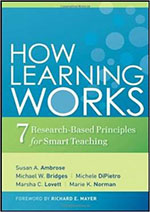 How Learning Works
How Learning Works
Mondays: 2/11, 2/18, 2/25
2:00-4:00 p.m.
This book distills the research on cognition, translating decades of scientific literature into practical advice for university faculty and introducing seven general principles of how people learn. The authors draw on research from cognitive, developmental, and social psychology, as well as educational research, anthropology, etc. The discussion spans issues from memory to motivation, integrating theory with real-classroom examples in practice. Participants will develop strategies for strengthening their own teaching through the application of these principles of cognitive psychology.
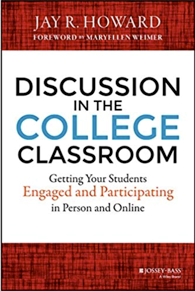 Discussion in the College Classroom\
Discussion in the College Classroom\
Tuesdays: 1/22, 1/29, 2/5
10:00 a.m. – 12:00 p.m.
Whether you have been teaching through class discussion for years, or you’d like to begin incorporating discussion into a course for the first time, this wonderful book is for faculty of all disciplines and experience levels. In Discussion in the College Classroom, Jay R. Howard, a professor of sociology, summarizes findings from an extensive body of research on discussion as a pedagogical technique, and shares practical approaches to keeping classroom discussions fresh, productive, and serving the learning goals, both in person and online. Participants will explore the findings and strategies in the book, and share their own plans for structuring thought-provoking class discussions.
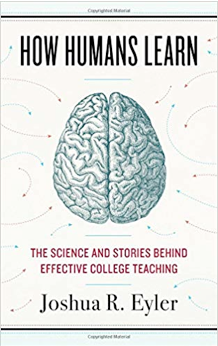 How Humans Learn: The Science and Stories behind Effective College Teaching
How Humans Learn: The Science and Stories behind Effective College Teaching
Wednesdays: 2/20, 2/27, 3/6
2:00-4:00 p.m.
Teaching is a challenging profession. One way to make it easier is to know more about the ways students learn. How Humans Learn surveys research in fields as diverse as developmental psychology, anthropology, and cognitive neuroscience for insight into the science behind learning. Joshua R. Eyler guides the reader through a story that ranges from investigations of the evolutionary record to studies of infants discovering the world for the first time, and from a look into how our brains respond to fear to a reckoning with the importance of gestures and language. In this reading group, we will explore five broad themes—curiosity, sociality, emotion, authenticity, and failure—and discuss practical takeaways for busy teachers.
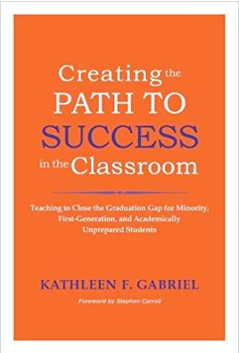 Creating the Path to Success in the Classroom: Teaching to Close the Graduation Gap for Minority, First-Generation, and Academically Unprepared Students
Creating the Path to Success in the Classroom: Teaching to Close the Graduation Gap for Minority, First-Generation, and Academically Unprepared Students
Dates TBD by Doodle Poll
Over the past few decades, extensive research has shown that we can significantly reduce achievement gaps and enhance student learning by adjusting our teaching practices and the ways we structure our courses. But where do we start? Kathleen Gabriel’s book provides practical strategies for building our courses to ensure that more students learn more and more deeply. Gabriel offers concrete steps we can take to enhance student motivation, structure class time effectively, prompt critical thinking, design effective assignments, and create classroom climates that promote learning.
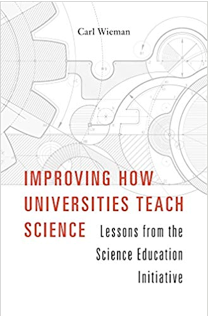 Improving How Universities Teach Science: Lessons from the Science Education Initiative
Improving How Universities Teach Science: Lessons from the Science Education Initiative
Registration closed
Nobel-winning physicist Carl Wieman is also an outspoken proponent of education research, and has spent decades studying the effects of scholarly approaches to teaching. His most recent book presents the results of an extensive science education initiative, and advocates substantial changes in the structure and strategies of college classes, to achieve far greater student learning. He also provides concrete strategies for improving teaching without imposing undue demands on faculty time.
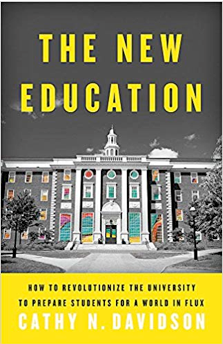 The New Education: How to Revolutionize the University to Prepare Students for a World In Flux
The New Education: How to Revolutionize the University to Prepare Students for a World In Flux
Dates TBD by Doodle Poll
Davidson argues that our current educational system was designed for an industrializing economy, and no longer offers students the type of preparation they require for a globalized and digital future. If universities are to remain relevant in our rapidly changing world, we’ll have to become more nimble. Davidson studies innovative faculty and institutions that have found ways to help students hone their creative, collaborative, and adaptive skills.
This reading/working group is designed especially for women who are interested in leadership positions in higher education, and is co-sponsored by the ACE Women’s Network of Florida, FSU Chapter.



